-
 Bitcoin
Bitcoin $84,912.1002
0.22% -
 Ethereum
Ethereum $1,597.4099
0.99% -
 Tether USDt
Tether USDt $1.0000
0.00% -
 XRP
XRP $2.0848
1.56% -
 BNB
BNB $592.5467
0.52% -
 Solana
Solana $138.6661
3.38% -
 USDC
USDC $1.0000
0.02% -
 Dogecoin
Dogecoin $0.1597
3.32% -
 TRON
TRON $0.2416
-1.86% -
 Cardano
Cardano $0.6327
3.32% -
 UNUS SED LEO
UNUS SED LEO $9.2836
0.56% -
 Chainlink
Chainlink $12.7262
1.41% -
 Avalanche
Avalanche $19.2768
1.31% -
 Stellar
Stellar $0.2442
1.08% -
 Toncoin
Toncoin $2.9950
1.32% -
 Shiba Inu
Shiba Inu $0.0...01231
4.65% -
 Hedera
Hedera $0.1668
2.11% -
 Sui
Sui $2.1474
1.41% -
 Bitcoin Cash
Bitcoin Cash $337.5269
2.68% -
 Hyperliquid
Hyperliquid $17.5726
3.68% -
 Polkadot
Polkadot $3.7336
2.05% -
 Litecoin
Litecoin $76.5245
1.70% -
 Dai
Dai $1.0001
0.02% -
 Bitget Token
Bitget Token $4.4585
2.30% -
 Ethena USDe
Ethena USDe $0.9993
0.01% -
 Pi
Pi $0.6558
7.05% -
 Monero
Monero $214.1926
-0.69% -
 Uniswap
Uniswap $5.2567
1.90% -
 Pepe
Pepe $0.0...07325
4.28% -
 OKB
OKB $50.6926
1.82%
How does blockchain ensure the security of transactions?
Blockchain's security relies on decentralization, cryptographic hashing for immutable blocks, consensus mechanisms validating transactions, and public transparency for verifiability, resisting single points of failure and fraudulent activity.
Mar 23, 2025 at 11:42 am
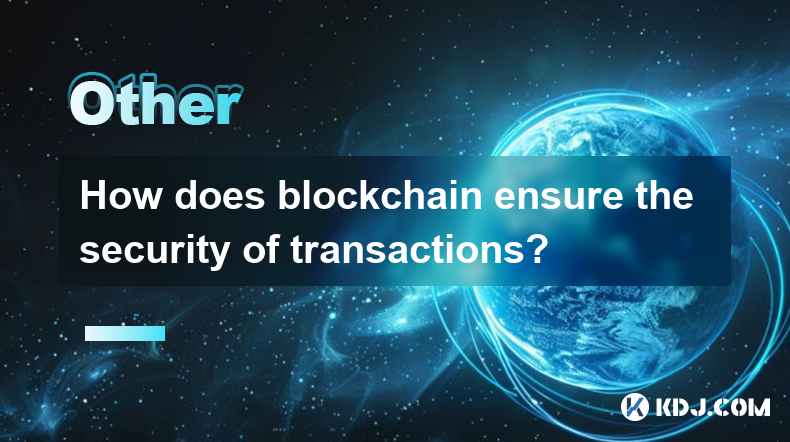
Key Points:
- Blockchain's decentralized nature makes it resistant to single points of failure.
- Cryptographic hashing secures individual blocks and links them chronologically.
- Consensus mechanisms validate transactions and add new blocks to the chain.
- Immutability prevents alteration of past transactions.
- Transparency and public verifiability allow for scrutiny of the blockchain.
How Does Blockchain Ensure the Security of Transactions?
Blockchain technology underpins the security of cryptocurrency transactions through a multi-layered approach combining cryptography, decentralization, and consensus mechanisms. Understanding these elements is crucial to grasping the inherent security of the system. Let's delve into each aspect individually.
Decentralization: The Foundation of Security
Unlike traditional systems reliant on centralized authorities, blockchain distributes its ledger across numerous nodes. This decentralization eliminates single points of failure. If one node is compromised, the rest of the network continues to operate, maintaining the integrity of the blockchain. This inherent redundancy is a cornerstone of blockchain security.
Cryptographic Hashing: Linking Blocks Securely
Each transaction is grouped into a "block." These blocks are linked chronologically using cryptographic hashing. A cryptographic hash function transforms data of any size into a unique, fixed-size string of characters. Even a minor change to the data results in a completely different hash. This ensures the integrity of each block and the entire chain. Tampering with a single transaction would alter its hash, rendering the entire subsequent chain invalid.
Consensus Mechanisms: Validating Transactions
Before a block is added to the blockchain, its transactions must be validated. This validation process is governed by consensus mechanisms, such as Proof-of-Work (PoW) or Proof-of-Stake (PoS). These mechanisms ensure that only legitimate transactions are included in the blockchain. The specific mechanism employed determines the security and efficiency of the network. For example, PoW requires significant computational power to add a block, making it computationally expensive to attack the network.
Immutability: The Unchangeable Ledger
Once a block is added to the blockchain, it becomes virtually immutable. The cryptographic linking of blocks and the consensus mechanism make it extremely difficult to alter past transactions. This immutability provides a high level of trust and security for all participants. Any attempt to modify past data would be immediately detectable by the network.
Transparency and Public Verifiability: Open for Inspection
Most blockchains are public and transparent, meaning that anyone can view the transactions on the blockchain. This transparency allows for public scrutiny and verification. While specific user identities might be masked using pseudonyms, the transactions themselves are visible for anyone to examine, promoting accountability.
Specific Security Measures Within Blockchain Transactions:
- Digital Signatures: Each transaction is signed using the sender's private key, verifying authenticity and preventing unauthorized spending. Only the holder of the private key can create a valid signature.
- Merkle Trees: These data structures efficiently verify the inclusion of specific transactions within a block, without needing to examine every transaction individually. This improves the efficiency of blockchain verification.
- Time-stamping: Each block is time-stamped, providing an auditable record of when transactions occurred. This chronological record is crucial for resolving disputes and maintaining accuracy.
- Network Redundancy: The decentralized nature of the network ensures that even if some nodes fail, the blockchain remains functional. The distributed nature makes the system resilient to attacks.
How does the blockchain deal with double-spending?
Double-spending refers to the fraudulent attempt to spend the same cryptocurrency twice. Blockchain prevents this through its consensus mechanism and the immutable nature of the chain. Once a transaction is validated and added to a block, it becomes part of the permanent record, preventing subsequent attempts to spend the same funds. The majority of nodes agreeing on the valid transaction chain effectively nullifies any attempts at double-spending.
What are the different consensus mechanisms used in blockchain and how do they impact security?
Different blockchains employ various consensus mechanisms. Proof-of-Work (PoW) requires significant computational power to validate transactions, making it resistant to attacks. Proof-of-Stake (PoS) relies on the stake held by validators, incentivizing honest behavior. Delegated Proof-of-Stake (DPoS) further streamlines validation by electing representatives. Each mechanism has its strengths and weaknesses regarding security and efficiency.
How secure is the blockchain against quantum computing threats?
Quantum computing poses a potential threat to the cryptographic algorithms currently used in blockchain technology. Researchers are actively exploring quantum-resistant cryptography to address this future challenge. The transition to quantum-resistant cryptography will be crucial for maintaining the long-term security of blockchain systems.
How does blockchain security compare to traditional financial systems?
Blockchain offers several security advantages over traditional systems. Its decentralized nature, cryptographic security, and immutability make it more resistant to fraud and single points of failure. However, traditional systems may have established regulatory frameworks and established security protocols that blockchain is still developing.
What are the limitations of blockchain security?
Despite its strengths, blockchain security isn't impenetrable. Smart contract vulnerabilities, 51% attacks (in some consensus mechanisms), and the potential for quantum computing to break current cryptography are significant concerns. Furthermore, human error in managing private keys remains a major security risk.
Disclaimer:info@kdj.com
The information provided is not trading advice. kdj.com does not assume any responsibility for any investments made based on the information provided in this article. Cryptocurrencies are highly volatile and it is highly recommended that you invest with caution after thorough research!
If you believe that the content used on this website infringes your copyright, please contact us immediately (info@kdj.com) and we will delete it promptly.
- Ethena Labs Unveils Converge, a New Layer-1 Blockchain Targeting Tokenized Real-World Assets
- 2025-04-19 12:20:14
- FBI Releases Five Warnings to Help Protect Investors in the Cryptocurrency Space
- 2025-04-19 12:20:14
- Today, the Official Trump ($TRUMP) meme coin tokens have been unlocked, sparking panic among investors.
- 2025-04-19 12:15:14
- Dogecoin (DOGE) Price Prediction: Will the Original Memecoin Reach $1 by Late Summer 2025?
- 2025-04-19 12:15:14
- Resilience is a Distinct Attribute of Solana
- 2025-04-19 12:10:13
- Astar Network Adjusts Its Token Issuance Model to Stabilize APY and Reduce Inflation
- 2025-04-19 12:10:13
Related knowledge
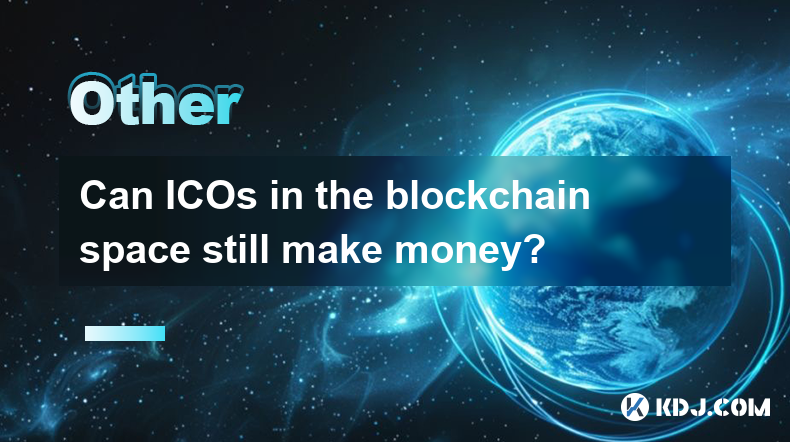
Can ICOs in the blockchain space still make money?
Apr 17,2025 at 08:29pm
The landscape of Initial Coin Offerings (ICOs) in the blockchain space has evolved significantly since their peak in 2017 and 2018. Despite the increased regulatory scrutiny and the rise of alternative fundraising methods like Security Token Offerings (STOs) and Initial Exchange Offerings (IEOs), ICOs can still be a viable way to raise funds and generat...
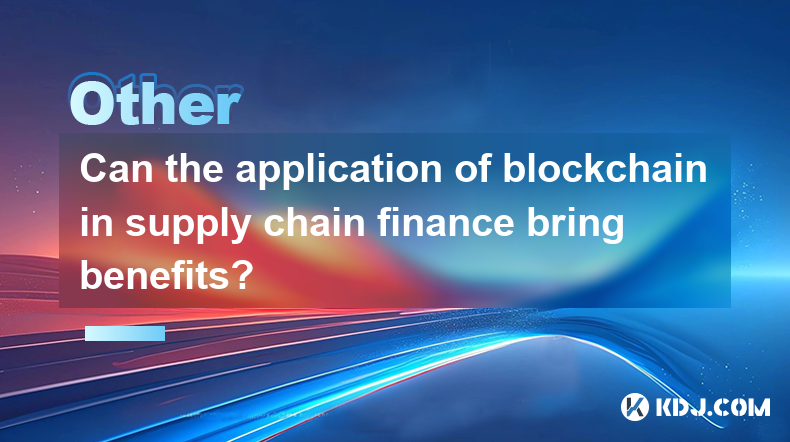
Can the application of blockchain in supply chain finance bring benefits?
Apr 15,2025 at 04:00pm
Can the application of blockchain in supply chain finance bring benefits? The integration of blockchain technology into supply chain finance has garnered significant attention in the cryptocurrency and financial sectors. This article explores how blockchain can potentially revolutionize supply chain finance, detailing its benefits and providing a compre...

Does the ranking of Chinese blockchain apps include cross-chain applications?
Apr 14,2025 at 04:00pm
The ranking of Chinese blockchain apps is a comprehensive evaluation that takes into account various aspects such as user base, transaction volume, and technological innovation. A pertinent question arises regarding whether these rankings include cross-chain applications. Cross-chain applications, which allow different blockchain networks to interact an...
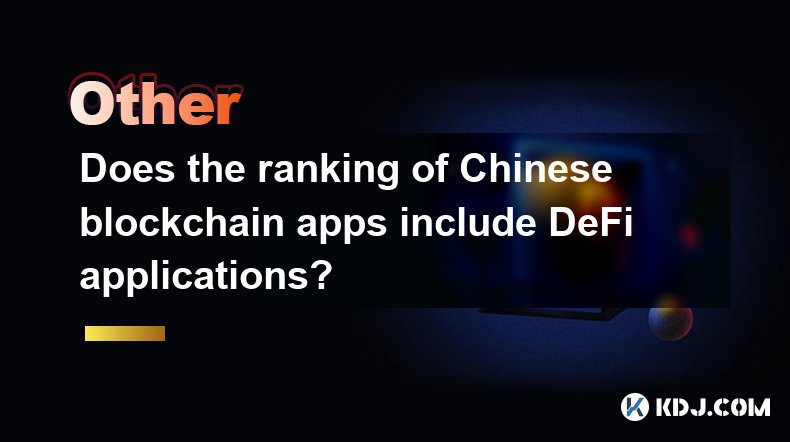
Does the ranking of Chinese blockchain apps include DeFi applications?
Apr 15,2025 at 06:57am
The ranking of Chinese blockchain apps is a comprehensive list that showcases the most popular and influential applications within the cryptocurrency ecosystem. One question that often arises is whether these rankings include DeFi applications. To answer this, we need to delve into the specifics of how these rankings are compiled and what types of appli...
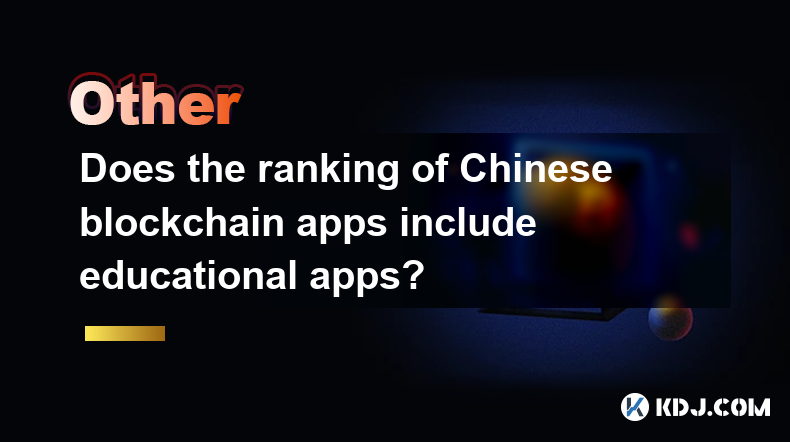
Does the ranking of Chinese blockchain apps include educational apps?
Apr 16,2025 at 03:35am
The ranking of Chinese blockchain apps often includes a variety of categories, from finance and gaming to social networking and beyond. One question that frequently arises is whether these rankings include educational apps. To address this, we need to delve into the specifics of how blockchain apps are categorized and ranked in China, and whether educat...
Does the ranking of Chinese blockchain apps include enterprise-level applications?
Apr 15,2025 at 06:42am
The ranking of Chinese blockchain apps often includes a variety of applications, ranging from consumer-focused to enterprise-level solutions. Understanding the scope and criteria for these rankings is essential to determine if enterprise-level applications are included. This article delves into the specifics of how Chinese blockchain app rankings are co...

Can ICOs in the blockchain space still make money?
Apr 17,2025 at 08:29pm
The landscape of Initial Coin Offerings (ICOs) in the blockchain space has evolved significantly since their peak in 2017 and 2018. Despite the increased regulatory scrutiny and the rise of alternative fundraising methods like Security Token Offerings (STOs) and Initial Exchange Offerings (IEOs), ICOs can still be a viable way to raise funds and generat...

Can the application of blockchain in supply chain finance bring benefits?
Apr 15,2025 at 04:00pm
Can the application of blockchain in supply chain finance bring benefits? The integration of blockchain technology into supply chain finance has garnered significant attention in the cryptocurrency and financial sectors. This article explores how blockchain can potentially revolutionize supply chain finance, detailing its benefits and providing a compre...

Does the ranking of Chinese blockchain apps include cross-chain applications?
Apr 14,2025 at 04:00pm
The ranking of Chinese blockchain apps is a comprehensive evaluation that takes into account various aspects such as user base, transaction volume, and technological innovation. A pertinent question arises regarding whether these rankings include cross-chain applications. Cross-chain applications, which allow different blockchain networks to interact an...

Does the ranking of Chinese blockchain apps include DeFi applications?
Apr 15,2025 at 06:57am
The ranking of Chinese blockchain apps is a comprehensive list that showcases the most popular and influential applications within the cryptocurrency ecosystem. One question that often arises is whether these rankings include DeFi applications. To answer this, we need to delve into the specifics of how these rankings are compiled and what types of appli...

Does the ranking of Chinese blockchain apps include educational apps?
Apr 16,2025 at 03:35am
The ranking of Chinese blockchain apps often includes a variety of categories, from finance and gaming to social networking and beyond. One question that frequently arises is whether these rankings include educational apps. To address this, we need to delve into the specifics of how blockchain apps are categorized and ranked in China, and whether educat...

Does the ranking of Chinese blockchain apps include enterprise-level applications?
Apr 15,2025 at 06:42am
The ranking of Chinese blockchain apps often includes a variety of applications, ranging from consumer-focused to enterprise-level solutions. Understanding the scope and criteria for these rankings is essential to determine if enterprise-level applications are included. This article delves into the specifics of how Chinese blockchain app rankings are co...
See all articles























































































